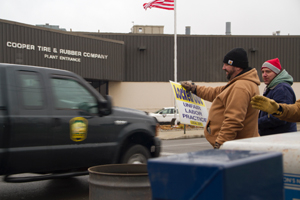After Union Bails Out Cooper Tire, Company Locks Workers Out

Steelworkers locked out at a Cooper Tire plant in Ohio are raising the alarm as scabs move in to start building tires.
The conflict at Cooper’s Findlay plant, where 1,050 Steelworkers build replacement tires for pickups, stems from new machinery the company recently introduced. Tires are mostly hand-built, but the equipment cut a step out of the process.
The company asked the union to accept a new rate system and figure out the details over the coming year. USW's Pat Gallagher said the union could not tell members what they would be earning, because the company would not define the new production standards.
The Steelworkers offered an extension to the agreement, but Cooper locked them out November 28. CEO Roy V. Armes is also a board member of the Manitowoc Co. in Wisconsin, where workers are on strike over Scott Walker-like union-busting demands.
MILLIONS IN GIVEBACKS
The Steelworkers are incensed by the lockout because the union gave back $31.2 million in concessions in the last contract and because the union had helped manufacturers like Cooper by lobbying successfully for a tariff on Chinese tires.
The tariff curtailed imports, boosted Cooper’s profitability, and allowed it to buy the new equipment, the union says. Cooper, which produces tires in China, did not join the call for the tariff—but now says its expiration next year mandates another round of concessions.
The company wants a five-tier wage scheme, no defined-benefit pensions for new hires, and no health care coverage for future retirees. Cooper made $302.4 million in profit between 2009 and September 2011.
Cooper workers make most of their money from an incentive system, said James Gutierrez, a steward and member of the civil rights committee.
“It’s a very physical job, with lots of twisting and turning,” he said. Part of Cooper’s new rate system would pay workers based on how far they walk during the job, instead of by how much time it takes to build the tire. That would mean time spent waiting for parts would be unpaid, Gutierrez said.
The Findlay plant’s starting hourly wage is $13. The Steelworkers haven’t had a raise in three years.
“We’re tired of losing ground,” Gutierrez said.
LONG ROAD AHEAD
Before the lockout, Findlay’s tire-builders had a rotating schedule that mandated work every other weekend—without any premium. The plant hummed 24 hours a day.
Cooper stockpiled inventories, and a tire trade magazine reports that suppliers aren’t worried about the short term, because December is a slow month.

SUPPORT LABOR NOTES
BECOME A MONTHLY DONOR
Give $10 a month or more and get our "Fight the Boss, Build the Union" T-shirt.
The company has eight factories in the U.S., Mexico, England, and China, and workers are fatalistic about the sharp whipsaws of global corporations.
“Realistically, if they wanted to close us down, they could,” said Teresa Brown, a 12-year veteran and member of the contract action team. “But at some point, you have to stand up. What are we going to make next contract, $8.50 an hour?”
Gallagher said the union is not coordinating bargaining or action with a sister USW local in Arkansas, where the contract for 1,300 members expires January 17.
The company has shipped molds there from Ohio to continue production.
Instead, the union will focus on a corporate campaign, targeting shareholders, customers, and suppliers. By sending in untrained scabs to restart production, “Cooper took a chance that could ruin its credibility,” Gutierrez said.
SHORT ON ARROWS
The tariff on Chinese tires that the Steelworkers won in September 2009 has led to a significant decline in imports. Two years later, tire imports from China are down 57 percent, according to the Department of Commerce.
The Steelworkers (and a few manufacturers) made their case for the tariff by pointing to a 215 percent rise in Chinese tire imports between 2004 and 2008, mostly at the lower end of the market. The surge led to 5,200 U.S. job losses, the union said.
The Chinese rubber trade association countered that the tariff would cost 100,000 jobs there.
The Steelworkers have also campaigned for and won dozens of tariffs against other specific imports, from steel pipe to wire to plates, and are calling for trade regulators to scrutinize China’s subsidies to its renewable energy sector—asserting that too much government help to business breaks World Trade Organization rules.
Linda Andros, legislative counsel for the Steelworkers in Washington, defended the union against charges that U.S. tariffs harm workers in other countries, noting that the USW regularly aids unions overseas and fights for stronger labor rights there through trade deals.
“We don’t have a lot of arrows in our quiver,” Andros said. “But if you stand by and do nothing, you’re going to lose capacity and jobs.”
Andros said the union can’t reshape the global trade regime by fighting one product at a time—much less attack what it sees as a multitude of sins that China commits against fair trade. Those include artificially undervaluing its currency (which lowers the cost of exports) and offering investors below-cost loans, free land, cheap electricity, tax adjustments, and a bevy of other subsidies—greater than the substantial help that U.S. states routinely offer companies.
Andros said that if it wanted to, the U.S. government could launch sanctions against China’s currency manipulation now, without waiting for a lengthy trade case to be heard. The blowback from China and the WTO would be fierce.





